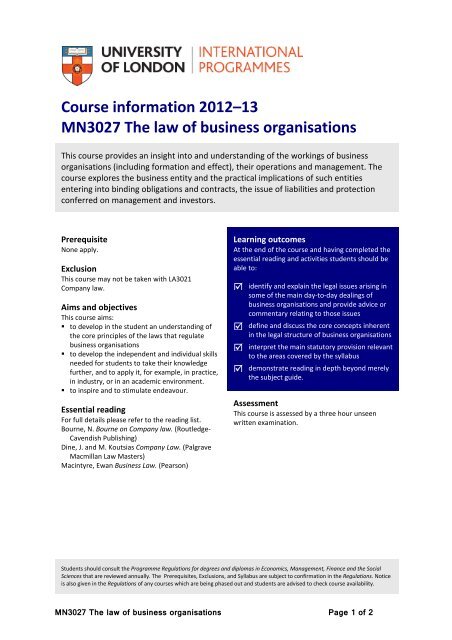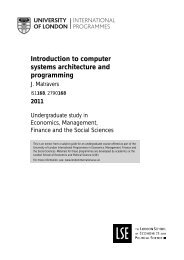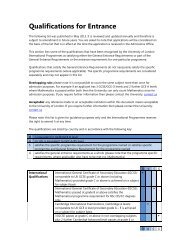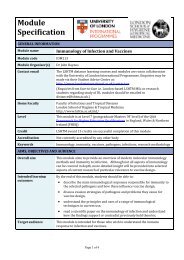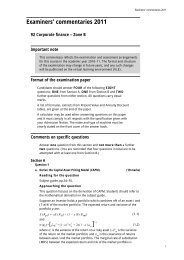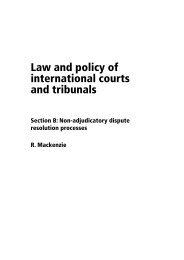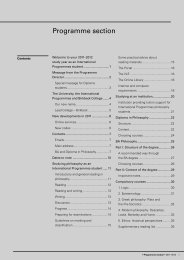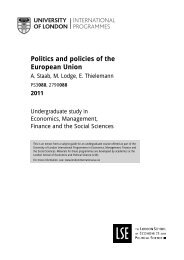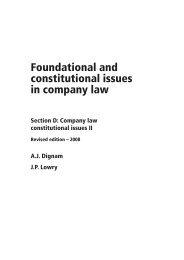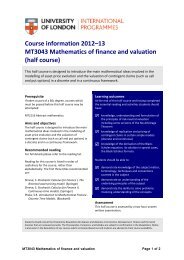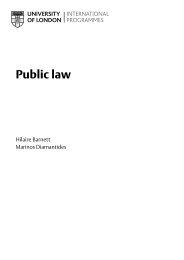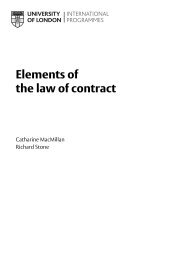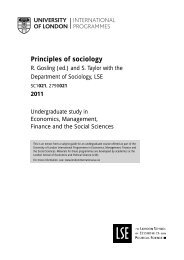Course information 2012–13 MN3027 The law of business ...
Course information 2012–13 MN3027 The law of business ...
Course information 2012–13 MN3027 The law of business ...
You also want an ePaper? Increase the reach of your titles
YUMPU automatically turns print PDFs into web optimized ePapers that Google loves.
<strong>Course</strong> <strong>information</strong> <strong>2012–13</strong><br />
<strong>MN3027</strong> <strong>The</strong> <strong>law</strong> <strong>of</strong> <strong>business</strong> organisations<br />
This course provides an insight into and understanding <strong>of</strong> the workings <strong>of</strong> <strong>business</strong><br />
organisations (including formation and effect), their operations and management. <strong>The</strong><br />
course explores the <strong>business</strong> entity and the practical implications <strong>of</strong> such entities<br />
entering into binding obligations and contracts, the issue <strong>of</strong> liabilities and protection<br />
conferred on management and investors.<br />
Prerequisite<br />
None apply.<br />
Exclusion<br />
This course may not be taken with LA3021<br />
Company <strong>law</strong>.<br />
Aims and objectives<br />
This course aims:<br />
to develop in the student an understanding <strong>of</strong><br />
the core principles <strong>of</strong> the <strong>law</strong>s that regulate<br />
<strong>business</strong> organisations<br />
to develop the independent and individual skills<br />
needed for students to take their knowledge<br />
further, and to apply it, for example, in practice,<br />
in industry, or in an academic environment.<br />
to inspire and to stimulate endeavour.<br />
Essential reading<br />
For full details please refer to the reading list.<br />
Bourne, N. Bourne on Company <strong>law</strong>. (Routledge-<br />
Cavendish Publishing)<br />
Dine, J. and M. Koutsias Company Law. (Palgrave<br />
Macmillan Law Masters)<br />
Macintyre, Ewan Business Law. (Pearson)<br />
Learning outcomes<br />
At the end <strong>of</strong> the course and having completed the<br />
essential reading and activities students should be<br />
able to:<br />
<strong>MN3027</strong> <strong>The</strong> <strong>law</strong> <strong>of</strong> <strong>business</strong> organisations Page 1 <strong>of</strong> 2<br />
<br />
<br />
<br />
<br />
identify and explain the legal issues arising in<br />
some <strong>of</strong> the main day-to-day dealings <strong>of</strong><br />
<strong>business</strong> organisations and provide advice or<br />
commentary relating to those issues<br />
define and discuss the core concepts inherent<br />
in the legal structure <strong>of</strong> <strong>business</strong> organisations<br />
interpret the main statutory provision relevant<br />
to the areas covered by the syllabus<br />
demonstrate reading in depth beyond merely<br />
the subject guide.<br />
Assessment<br />
This course is assessed by a three hour unseen<br />
written examination.<br />
Students should consult the Programme Regulations for degrees and diplomas in Economics, Management, Finance and the Social<br />
Sciences that are reviewed annually. <strong>The</strong> Prerequisites, Exclusions, and Syllabus are subject to confirmation in the Regulations. Notice<br />
is also given in the Regulations <strong>of</strong> any courses which are being phased out and students are advised to check course availability.
Syllabus<br />
This is a description <strong>of</strong> the material to be examined, as published in the Regulations. On registration,<br />
students will receive a detailed subject guide which provides a framework for covering the topics in the<br />
syllabus and directions to the essential reading<br />
<strong>The</strong> role <strong>of</strong> <strong>law</strong>: <strong>The</strong> nature and sources <strong>of</strong> <strong>law</strong>;<br />
the distinction between private and public <strong>law</strong>;<br />
the role <strong>of</strong> <strong>law</strong> in the creation and maintenance<br />
<strong>of</strong> <strong>business</strong> organisations; the nature <strong>of</strong><br />
contract, agency and trusts and their relevance<br />
to the operation <strong>of</strong> <strong>business</strong> organisations.<br />
Forms <strong>of</strong> <strong>business</strong> organisation:<br />
<strong>The</strong> distinction between:<br />
individual and collective trading<br />
registered and unregistered organisations<br />
incorporated and unincorporated<br />
organisations<br />
public and private companies<br />
limited and unlimited companies<br />
companies limited by shares and companies<br />
limited by guarantee.<br />
<strong>The</strong> formation and operation <strong>of</strong> each <strong>of</strong> the<br />
above types <strong>of</strong> organisation; the nature <strong>of</strong> the<br />
constitution; how funds are raised for the<br />
purpose <strong>of</strong> carrying the proposed <strong>business</strong>.<br />
Limited liability: <strong>The</strong> meaning and significance<br />
<strong>of</strong> limited liability; who is entitled to limited<br />
liability; the concept <strong>of</strong> the veil <strong>of</strong> incorporation<br />
and the lifting <strong>of</strong> the veil; fraudulent and<br />
wrongful trading.<br />
Dealings between the organisation and the<br />
outside world: <strong>The</strong> relevance <strong>of</strong> the constitution<br />
to the dealings <strong>of</strong> the organisation; registered as<br />
opposed to unregistered organisations; when<br />
the organisation will be bound to contracts and<br />
other dealings with third parties – the relevance<br />
<strong>of</strong> principles <strong>of</strong> agency and the alter ego<br />
doctrine; the distinction between void and<br />
voidable acts.<br />
Surveillance <strong>of</strong> actions within the organisation:<br />
<strong>The</strong> nature <strong>of</strong> the relationship between the<br />
organisation and its members; the duties <strong>of</strong><br />
directors <strong>of</strong> companies and other executive<br />
committee members <strong>of</strong> different organisations;<br />
the ratification <strong>of</strong> breach <strong>of</strong> such duties; the<br />
enforcement <strong>of</strong> remedies for such breach and<br />
the protection <strong>of</strong> minorities.<br />
Terminating the organisation: Circumstances<br />
leading to the termination <strong>of</strong> the organisation;<br />
different methods <strong>of</strong> termination; the<br />
importance <strong>of</strong> the distinction between solvent<br />
and insolvent organisations.<br />
<strong>MN3027</strong> <strong>The</strong> <strong>law</strong> <strong>of</strong> <strong>business</strong> organisations Page 2 <strong>of</strong> 2


